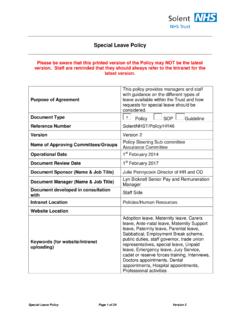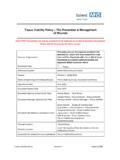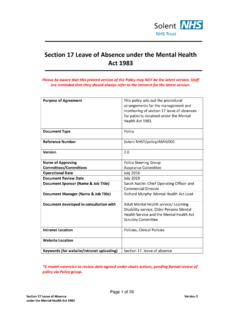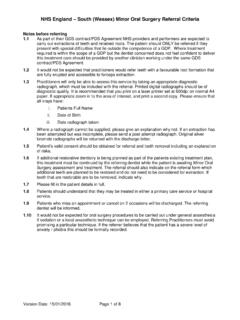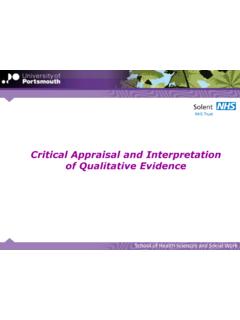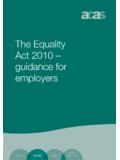Transcription of MANAGING CONCERNS AND COMPLAINTS POLICY …
1 MANAGING CONCERNS and COMPLAINTS POLICY and Procedure Page 1 of 27 MANAGING CONCERNS AND COMPLAINTS POLICY AND PROCEDURE Solent NHS Trust policies can only be considered to be valid and up-to-date if viewed on the intranet. Please visit the intranet for the latest version. Purpose of Agreement The purpose of this POLICY is to describe the Trust's POLICY with regard to MANAGING CONCERNS and COMPLAINTS in accordance with national guidance. The POLICY explains the means by which a patient or their representative can raise a concern or complaint and the responsibilities of staff to whom the complaint is addressed. Document Type POLICY SOP Guideline Reference Number Solent NHST/ POLICY / GO05 Version Name of Approving Committees/Groups POLICY Steering Group Assurance Committee Operational Date February 2016 Document Review Date February 2019 Document Sponsor (Name & Job Title) Mandy Rayani, Chief Nurse Document Manager (Name & Job Title) Stuart Bloom, PALS & COMPLAINTS Manager Document developed in consultation with National Guidelines and Regulations Intranet Location Insert the location of the document on the intranet Website Location Insert the location of the document on the FOI Publication Scheme Keywords (for website/intranet uploading)
2 COMPLAINTS , POLICY , Concern, Plaudits x MANAGING CONCERNS and COMPLAINTS POLICY and Procedure Page 2 of 27 Amendments Summary: Amend No Issued Page Subject Action Date Review Log Include details of when the document was last reviewed: Version Number Review Date Lead Name Ratification Process Notes MANAGING CONCERNS and COMPLAINTS POLICY and Procedure Page 3 of 27 Table of Contents Section Page No 1 Introduction And Purpose 4 2 Scope And Definition 4 3 National Guidance 5 4 Principles Of Good Practice For Resolving CONCERNS And COMPLAINTS 6 5 COMPLAINTS that cannot be dealt with under this POLICY 7 6 Role And Responsibilities of Staff In The Local Resolution of CONCERNS / COMPLAINTS 7 7 Who May Raise A Concern/Complaint 9 8 How To Raise A Concern/Complaint 10 9 Procedure For Handling CONCERNS 10 10 Procedure For Handling COMPLAINTS 11 11 COMPLAINTS Involving other Organisations 11 12 Performance Targets for Resolution of COMPLAINTS 11 13 Unresolved COMPLAINTS 13 14
3 Confidentiality and Consent 13 15 Providing a Statement 13 16 Providing a Written Response 14 17 The Provision of Redress and Ex-Gratia Payments 14 18 Monitoring Performance Management and Data Collection 15 19 COMPLAINTS Investigation and Risk Management 16 20 File Storage And Archiving 16 21 Publicity 17 22 COMPLAINTS and Disciplinary Procedures 17 23 Complainants with Communication Difficulties 17 24 Persistent and Unreasonable Contact and Unusual COMPLAINTS 17 25 Out of Hours Contact Arrangements 18 26 Training 18 27 Staff Support and Writing A Statement 18 28 29 30 31 32 Learning From COMPLAINTS Success Criteria/ Monitoring Effectiveness Review Linked Documents Glossary 19 19 19 19 20 Appendices Appendix 1: COMPLAINTS Pathway and timescales 20 Appendix 2: COMPLAINTS and Incidents Flowchart 21 Appendix 3: Assessing the Seriousness of the Complaint 22 Appendix 4: My Expectations: A User-Led Version for Raising CONCERNS and COMPLAINTS (PHSO 2014) 24 Appendix 5: Equality Impact Assessment Form 25 MANAGING CONCERNS and COMPLAINTS POLICY and Procedure Page 4 of 27 1.
4 INTRODUCTION AND PURPOSE The purpose of this POLICY is to describe the Trust's POLICY with regard to MANAGING CONCERNS and COMPLAINTS in accordance with national guidance. The POLICY explains the means by which a patient or their representative can raise a concern or complaint and the responsibilities of staff to whom the complaint is addressed. It also outlines the action to be taken by the service involved and offers guidance on good practice at each stage of the process. The pathway for MANAGING CONCERNS and COMPLAINTS is summarised in Appendix 1. This POLICY aims to ensure that: All COMPLAINTS are well managed as quickly as possible and in accordance with national assurance frameworks Staff are empowered to deal with COMPLAINTS as they arise in an open and non-defensive way The learning from COMPLAINTS is identified and used for improvement The COMPLAINTS service is accessible, well publicised, open and transparent The COMPLAINTS procedure is supportive for those who find it difficult to complain The Trust will ensure that all COMPLAINTS are reviewed at the highest level of the organisation to identify learning opportunities for those services directly involved in the complaint and the organisation as a whole.
5 The Trust is committed to promoting equality and diversity. No patient, or any other person involved in the investigation and resolution of a concern or complaint will receive unfair treatment as a result of raising a complaint or on the grounds of age, race, colour, ethnic or national origin, religious or equivalent belief system, political beliefs, gender, marital or partnership status, sexual orientation, disability, gender reassignment, pregnancy/maternity status, or any other condition or requirement which cannot be justified and which causes disadvantage. Appropriate assistance including reasonable adjustments should be offered to any person who may be at a disadvantage for any of these reasons. The Trust Board will ensure that there are clear policies and procedures for the handling of CONCERNS and COMPLAINTS and that appropriate expertise and resources are available to enable its responsibilities to be effectively discharged.
6 2. DEFINITIONS and SCOPE A complaint is an expression of dissatisfaction made to an organisation, either written or spoken, and whether justified or not, which requires a response. There is no difference between a formal complaint and an informal complaint. Both are expressions of dissatisfaction , The Patient s Association, 2013. A concern is a problem raised that can be resolved / responded to straight away by the service (by the end of the next working day or earlier). Although CONCERNS that are resolved in this way do not need to be recorded as COMPLAINTS , the service must give the details of the issues raised and resolution to the PALS and COMPLAINTS team (see COMPLAINTS toolkit). If it is not possible to resolve the concern within this time frame, the issue will need to be recorded as a formal complaint and managed according to the COMPLAINTS POLICY .
7 MANAGING CONCERNS and COMPLAINTS POLICY and Procedure Page 5 of 27 A plaudit is an unsolicited expression of praise or thanks received by a department or service in relation to the service, care or treatment provided. Plaudits are reported to the PALS and COMPLAINTS team following the process for reporting plaudits (see COMPLAINTS toolkit). This CONCERNS and COMPLAINTS POLICY applies to all directly and indirectly employed staff within Solent NHS Trust and other persons working within the organisation. Responsibility for ensuring compliance with this POLICY rests with the Chief Nurse. The PALs and COMPLAINTS Manager is responsible for ensuring that all CONCERNS / COMPLAINTS are fully investigated and responded to within the agreed timeframe.
8 All staff have a responsibility to read this POLICY and understand its impact on their area of work. Staff should be able to respond appropriately to a complainant and endeavour to achieve immediate resolution. If this is not possible, all staff have the responsibility to escalate the concern/complaint in accordance with this POLICY . Openness Transparency and Candour Following the Francis Report (2013) it is a requirement for clinicians to be candid with patients about avoidable harm and for safety CONCERNS to be reported openly and truthfully. Solent NHS Trust must be accurate, candid and must not provide misleading information to the public, regulators and commissioners. Definitions of Openness, Transparency and Candour are as follow: Openness - enabling CONCERNS and COMPLAINTS to be raised freely without fear, with questions asked being answered; Transparency - accurate information about performance and outcomes to be shared with staff, patients, the public and regulators; Candour - any patient harmed by a healthcare service is informed of the fact and an appropriate remedy offered, regardless of whether a complaint has been made.
9 Being open involves: Acknowledging, apologising and explaining when things go wrong; Conducting a thorough investigation into the incident, complaint or claim; Reassuring patients, their families and carers that lessons learnt will help prevent incidents occurring; and Providing support for those involved to cope with the physical and psychological consequences of what happened. Solent NHS Trust and everyone working for the organisation must be honest, open and truthful in all their dealings with patients and the public, and organisational and personal interests must never be allowed to outweigh the duty to be honest open and truthful. 3. NATIONAL GUIDANCE The National Guidance underpinning this POLICY includes the following.
10 The Local Authority Social Services and National Health Service COMPLAINTS (England) Regulations 2009 (the Regulations 2009) MANAGING CONCERNS and COMPLAINTS POLICY and Procedure Page 6 of 27 NHS Constitution (2009) Making Experiences Count A New Approach to Responding to COMPLAINTS (June 2007) Principles of Good Complaint Handling, Parliamentary and Health Service Ombudsman (2009) My Expectations for raising CONCERNS and COMPLAINTS , Parliamentary and Health Service Ombudsman, Local Government Ombudsman (LGO) and Healthwatch England (HWE), 2014 A review into the quality of NHS COMPLAINTS investigations where serious or avoidable harm has been alleged, Parliamentary and Health Service Ombudsman, 2015 Report of the Mid Staffordshire NHS Foundation Trust Public Inquiry (2013) Berwick Review: A promise to learn a commitment to act; Improving the Safety of Patients in England (2013) Clwyd & Hart: A Review of the NHS Hospitals COMPLAINTS System: Putting patients back in the picture (2013) Office of the Children s Commissioner: Child Friendly COMPLAINTS Processes in the Health Service (2013): Hard Truths: Mid Staffordshire NHS FT public inquiry.
